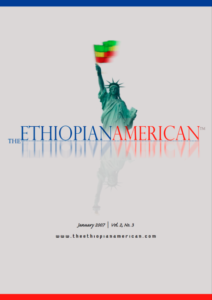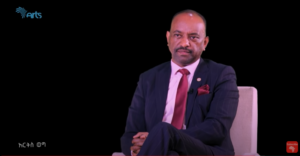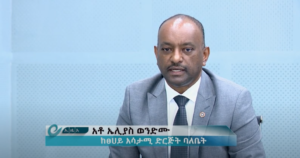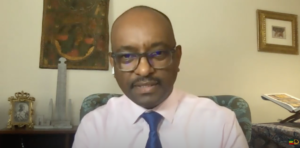THE ETHIOPIAN AMERICAN MAGAZINE – When Elias Wondimu was growing up in Addis Ababa, he and his friends would often wake up early to catch the first bus to the national library. If it was full, they would race to line up in front of the municipal library, which opened an hour later. If there were no seats to be found there, the group headed for the library at the Ministry of Information.
Years later, Wondimu is publishing books that will line the shelves of such libraries, waiting for the eyes of the next generation of young people who are hungry for knowledge.
Wondimu’s company, Tsehai Publishers and Distributors, has published more than thirty books relating to Ethiopia, Africa and the Diaspora since he founded it in Los Angeles in 1998. Tsehai provides a literary home to writers like Shumet Sishagne, a University of Virginia history professor who wrote Unionists and Separatists, The Vagaries of Ethio-Eritrean Relation, 1941-1991 (coming 2007) and Professor Fassil G. Kiros, an economist and author of Enough with Famines in Ethiopia: A Clarion Call.
Books like this were not readily available to Wondimu as a young man. In college he says he typically had to rely on thirty year old volumes when he tried to read up on his homeland.
This void stung, but Wondimu, spent his youth dreaming, not of publishing but of being a surgeon.
His focus shifted after the government change Ethiopia experienced in 1991. Wondimu counted himself among the disgruntled and began to write anonymously to help bring about reform. He eventually became a column editor at the Moged newspaper, a publication known at the time for its aggressive, meticulously documented investigations. Like many journalists who were trying to elucidate what was happening in the shadows of government, Wondimu’s life was soon in danger.
While Wondimu was visiting Michigan State University for an International Conference of Ethiopian Studies in 1994, his colleagues back in Ethiopia were being imprisoned. “My three week travel plan became indefinite,” he said.
Wondimu settled in Los Angeles where he was hired by Ethiopian Review magazine, which he describes a gateway for information for community and political organizations in the Ethiopian exile community. Eventually becoming the magazine’s managing editor, Wondimu encountered exiled Ethiopians who were full of stories, knowledge and information that deserved preservation. When he asked them why they weren’t writing books, they would often respond that no publishing company wanted their work.
While the war between Ethiopia and Eritrea was ending in 2000, he and his colleague Elias Kifle stopped the Ethiopian Review magazine in disillusionment. “Everything we had done was to avoid war,” he said, “We tried to educate the masses so they could say no to war and no to dictatorship and no to inhumane governance. To give people the facts so they can act accordingly…After the war I wanted to go away from anything Ethiopian for a while.”
Lucky for those who read Tsehai books, he couldn’t stay away.
A job at the University of California Los Angeles research center and publication department deepened his experience in editing, marketing and publishing. It also further convinced him of the need for a publishing outlet for scholars who were writing serious books about Ethiopia. When he would try to order books on Ethiopia he faced difficulty. “The publishers’ just didn’t care,” he said.



In 2001 he left his job at UCLA and committed to filling this void. With the help of his sister, Elsa Wondimu, he overcame the financial hurdles of the day to day life and published Diary of a Journey to Abyssinia 1868, which was edited and annotated by Richard Pankhurst, Peter Harrington and Frederic A. Sharf. He went on to publish the first English translation of the 16th century manuscript Futuh Al-Habasha: The Conquest of Abyssinia and is approaching the publication of Tsehai’s 40th book.
Robert Collins, a professor of History, emeritus, at the University of California Santa Barbara whose book Civil Wars and Revolution in the Sudan: Essays on the Sudan, Southern Sudan, and Darfur, 1962-2004, was published by Tsehai, said of Wondimu’s efforts, “We have a huge Ethiopian population in the United States but his (Wondimu’s) company is the only one that really does anything for them. Other companies have the odd book on Ethiopia but nothing as comprehensive as what he does.”
“He’s one of a kind. He’s only been in this country a little over a decade and he’s done more than the rest of us who have been here thirty years or more…His approach has been to elevate the level of intellectual discourse on Ethiopia…He’s dogged about what he wants to do. Come hell or high water he does it,” adds Professor Alemayehu G. Mariam, a professor of legal studies at California State University at San Bernardino who worked with Wondimu as editor of Ethiopian Review and currently works with him on the International Journal of Ethiopian Studies.
The press is named in honor of his late mother, whose name, “Tsehai” means “sun” in Amharic. His drive to succeed came from a father that he says had no knowledge of the word impossible. “He committed his life to public service,” Wondimu says of his father, who lives in Los Angeles, “He believed that if the community is served, the family will be served.”
Wondimu has also found time to establish the Ethiopian Institute for Nonviolence Education and Peace Studies – www.eineps.org. This organization, in conjunction with Tsehai’s International Journal of Ethiopian Studies hosts the annual Tsehai conferences on the State of Ethiopian Affairs and the Diaspora. At last year’s conference, scholars gathered for panel discussions such as “Ethiopia’s past legacy, present challenges and future prospects,” “The State of Ethiopian Media at Home and in the Diaspora,” and “The State of the May 2005 Election, its Aftermath and What ought to be done.”
Wondimu doesn’t hesitate to wed his intellectual pursuits with practical ones. He is one of four founders of the African Global Market Enterprise, which seeks to help African businesses get around expensive middle men who profit from the global economy. “Many Africans do business, we’re producers or buyers, but we don’t have any kind of [global] infrastructure.” He says. To that end, Wondimu and his partners are trying to level the playing field for African businesses. At www.AfricanMarket.com and www.AfricanTrade.com Wondimu and his colleagues provide a platform to facilitate electronic trading, for example.
His efforts will have come full circle when one day, young men and women race to libraries in Addis Ababa that will soon be founded by his Ethiopian Heritage Foundation (www.ehfoundation.org) to find books published by Tsehai and distributed through economic infrastructure that benefits members of the African Diaspora.
To learn more about Tsehai publishing, visit www.tsehaipublishers.com.
Erica Bryant is editorial staff writer for the Democrat & Chronicle, a Gannett newspaper in Rochester, New York.
The Ethiopian American Magazine is published online by The Ethiopian American LLC (the “EA”), a New York Limited Liability Corporation. The EA is committed to providing the highest quality of reporting and analysis of news, complex social and historical issues as well as literary works from the most reputable sources of our time. Through our writers we hope to inspire, inform and serve as essential reference to our readers on and about Ethiopia and Ethiopians in Diaspora and in Ethiopia.
Publisher & Editor: Yohannes Assefa | publisher@theethiopianamerican.com | http://www.theethiopianamerican.com









